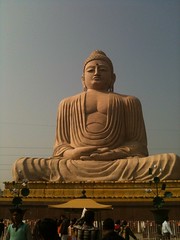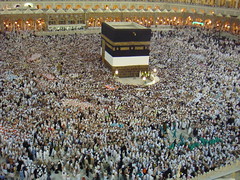AP Human Geography - Religion Flashcards
Vocabulary flashcards from chapter 7 on religion
| 8697289622 | Religion | a system of beliefs and practices that attempts to order life in terms of culturally perceived ultimate priorities |  | 0 |
| 8697289623 | Secularism | the idea that ethical and moral standards should be formulated and adhered to for life on Earth, not to accommodate the prescriptions of deity and promise of a comfortable afterlife. |  | 1 |
| 8697289624 | Monotheistic Religion | belief system in which one supreme being is revered as creator and arbiter of all that exists in the universe |  | 2 |
| 8697289625 | Polytheistic Religion | belief system in which multiple deities are revered as creators and arbiters of all that exists in the universe |  | 3 |
| 8697289626 | Animistic Religion | the belief that inanimate objects, such as hills, trees, rocks, rivers, and other elements of the natural landscape, possess souls and can help or hinder human efforts on Earth |  | 4 |
| 8697289627 | Universalizing Religion | a belief system that espouses the idea that there is one true religion that is universal in scope. Adherents of universalizing religious systems often believe that their religion represents universal truths, and in some cases great effort is undertake in evangelism and missionary work. |  | 5 |
| 8697289628 | Ethnic Religion | a religion that is particular to one, culturally distinct, group of people. |  | 6 |
| 8697289629 | Hinduism | one of the oldest religions in the modern world, dating back over 4000 years, and originating in the Indus River Valley of what is today part of Pakistan... is unique among the world's religions in that it does not have a single founder, a single theology, or agreement on its origins. |  | 7 |
| 8697289630 | Caste System | the strict social segregation of people—specifically in India's Hindu society—on the basis of ancestry and occupation |  | 8 |
| 8697289631 | Buddhism | religion founded in the sixth century BCE and characterized by the belief that enlightenment would come through knowledge, especially self-knowledge; elimination of greed, craving, and desire; complete honesty; and never hurting another person or animal. |  | 9 |
| 8697289632 | Shintoism | religion located in Japan and related to Buddhism. .... focuses particularly on nature and ancestor worship. |  | 10 |
| 8697289633 | Taoism | religion believed to have been founded by Lao-Tsu and based upon his book entitled "Tao-te-ching," or "Book of the Way." Lao-Tsu focused on the proper form of political rule and on the oneness of humanity and nature. |  | 11 |
| 8697289634 | Confucianism | a philosophy of ethics, education, and public service based on the writings of Confucius and traditionally thought of as one of the core elements of Chinese culture. |  | 12 |
| 8697289635 | Judaism | religion with its roots in the teachings of Abraham (from Ur), who is credit with uniting his people to worship only one God. According to Jewish teaching, Abraham and God have a covenant in which the Jews agree to worship only one God, and God agrees to protect his chosen people, the Jews. |  | 13 |
| 8697289636 | Diaspora | from the Greek "to disperse," a term describing forceful or voluntary dispersal of a people from their homeland to a new place. Originally denoting the dispersal of Jews, it is increasingly applied to other population dispersals, such as the involuntary relocation of Black peoples during the slave trade or Chinese peoples outside of Mainland China, Taiwan, and Hong Kong. |  | 14 |
| 8697289637 | Zionism | the movement to unite the Jewish people of the diaspora and to establish a national homeland for them in the promised land |  | 15 |
| 8697289638 | Christianity | religion based on the teachings of Jesus. According to Christian teaching, Jesus is the son of God, placed on Earth to teach people how to live according to God's plan |  | 16 |
| 8697289639 | Eastern Orthodox Church (eoc) | one of the three major branches of Christianity, the EOC, together with the Roman Catholic Church, a second of the three major branches of Christianity, arose out of the division of the Roman Empire by Emperor Diocletian into four governmental regions: two western regions centered in Rome, and two eastern regions centered in Constantinople (now Istanbul, Turkey). In 1054 CE, Christianity was divided along that same line when the EOC, centered in Constantinople; and the Roman Catholic Church, centered in Rome, split. |  | 17 |
| 8697289640 | Roman Catholic Church (rcc) | one of the three major branches of Christianity, the RCC, together with the Eastern Orthodox Church, a second of the three major branches of Christianity, arose out of the division of the Roman Empire by Emperor Diocletian into four governmental regions; two western regions centered in Rome, and two eastern regions centered in Constantinople (now Istanbul). In 1054 CE, Christianity was divided along that same line when the EOC and the RCC split. |  | 18 |
| 8697289641 | Protestant | one of three major branches of Christianity (together with the EOC and the RCC). Following the widespread societal changes in Europe starting in the 1300s CE, many adherents to the RCC began to question the role of religion in their lives and opened the door to the Protestant Reformation wherein John Huss, Martin Luther, John Calvin, and others challenged many of the fundamental teachings of the RCC. |  | 19 |
| 8697289642 | Islam | the youngest of the major world religions, Islam is based on the teachings of Muhammad, born in Mecca in 571 CE. According to the teaching, Muhammad received the truth directly from Allah in a series of revelations during which Muhammad spoke the verses of the Qu'ran (Koran), the Islamic holy book. |  | 20 |
| 8697289643 | Sunnis | Adherents to the largest branch of Islam, called the orthodox or traditionalist. They believe in the effectiveness of family and community in the solution of life's problems, and they differ from the Shiites in accepting the traditions of Muhammad as authoritative |  | 21 |
| 8697289644 | Shiites | adherents of one of the two main divisions of Islam.... represent the Persian (Iranian) variation of Islam and believe in the infallibility and divine right to authority of the Imams, argued that the teaching should be hereditary, rule should be passed to Muhammad's son-in-law Ali |  | 22 |
| 8697289645 | Indigenous Religions | belief systems and philosophies practiced and traditionally passed from generation to generation among peoples within a ... tribe or group |  | 23 |
| 8697289646 | Pilgrimage | voluntary travel by an adherent to a sacred site to pay respects or participate in a ritual at the site |  | 24 |
| 8697289647 | Sacred Sites | place or space people infuse with religious meaning |  | 25 |
| 8697289648 | Minarets | tower attached to a Muslim mosque, having one or more projecting balconies from which a crier call Muslims to prayer |  | 26 |
| 8697289649 | Hajj | the Muslim pilgrimage to Mecca, the birthplace of Muhammad |  | 27 |
| 8697289650 | Interfaith Boundaries | boundaries between the world's major faiths |  | 28 |
| 8697289651 | Intrafaith Boundaries | boundaries within a single major faith |  | 29 |
| 8697289654 | Religious Fundamentalism | religious movement whose objectives are to return to the foundations of the faith and to influence state policy |  | 30 |
| 8697289655 | Religious Extremism | religious fundamentalism carried to the point of violence |  | 31 |
| 8697289656 | Shari'a Laws | The system of Islamic law, sometimes called Quranic law. Unlike most western systems of law that are based on legal precedence, sharia is based on varying degrees of interpretation of the Quran. |  | 32 |
| 8697289657 | Jihad | a doctrine within Islam. Commonly translated as "Holy War," Jihad represents either a personal or collective struggle on the part of Muslims to live up to the religious standards set by the Qu'ran |  | 33 |
| 8697309564 | Syncretism | The blending traits from two different cultures to form a new trait. |  | 34 |



